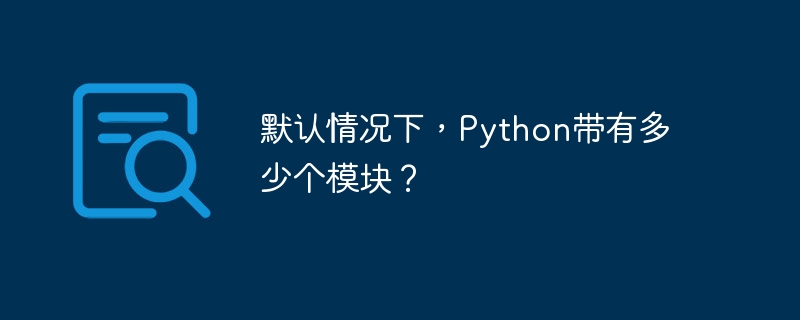

Python is an open source programming language that is widely used for various purposes, including website development, data analysis, artificial intelligence, machine learning, etc. One of the main advantages of Python is its modular architecture, allowing developers to easily extend its functionality by importing pre-written code modules. So, how many Python modules are available by default?
To go ahead with the article, we should have a glimpse of the module in Python. A module is a file containing definitions and statements of Python. Modules can be called or imported into other modules and can contain classes, functions, and variables that can be used by other components of the program.
Python’s standard library contains a large number of built-in modules. These modules cover a wide range of functionality, from basic operations such as file I/O and string processing, to more advanced topics such as networking and web development.
So, how many Python modules are available by default? The answer is not simple, as the number of modules included in the standard library depends on the Python version used. However, as of Python 3.10, the standard library contains over 200 built-in modules.
A few of the foremost commonly utilized modules within the standard library include −
os − Gives a way to be associated with the record framework, counting making, erasing, and renaming records and directories.
sys − Provides data about the Python interpreter and running environment.
re − Provides regular expression matching operations, which is very useful for searching and manipulating text data.
math − Provides a set of numerical abilities, including trigonometric function abilities,
random − Gives capacities for creating arbitrary numbers, which are regularly utilized in reenactments and games.
datetime − Provides classes for working with dates and times, including formatting and parsing date strings.
urllib − Provides a way to associate with web pages and URLs, including download records and web crawlers.
json − Gives capacities for encoding and translating JSON information, which could be a well-known information arrangement utilized in web applications.
sqlite3 − Provides a way to associate with SQLite databases that are lightweight and easy to use.
threading − Gives a way to compose concurrent programs by running different strings of execution inside a single program.
These modules are a good choice among the many modules in the standard library. There are many other modules available for a variety of purposes, including XML parsing, encryption, and graphical client interface development.
In expansion to the standard library, there are too numerous third-party Python modules accessible for download and utilization. These modules can be introduced utilizing Python's built-in bundle supervisor, pip. The Python Package Index (PyPI) can be a store of over 300,000 bundles, making it basic for engineers to find and present the modules they require.
In short, Python comes with a large number of built-in modules, which are included in the standard library. The number of modules included can vary depending on the version of Python used, but as of Python 3.10, there are over 200 modules available by default. These modules cover a wide range of functionality, from basic file I/O and string handling to more advanced topics such as networking and web development. In addition, there are many third-party Python modules available for download and use, allowing developers to easily extend the functionality of their programs.
The above is the detailed content of How many modules does Python come with by default?. For more information, please follow other related articles on the PHP Chinese website!




